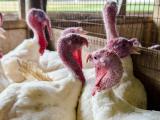Feb 1, 2008 (CIDRAP News) – Two more patients in Indonesia have died of H5N1 avian influenza this week, raising the country's death toll from the virus to 102 out of 124 cases.
The patients, whose illnesses were reported previously, were a 31-year-old woman from East Jakarta, who died yesterday, and a 32-year-old man from Tangerang, who died Jan 29, according to the World Health Organization (WHO).
The woman became ill Jan 18 and was hospitalized 4 days later, according to a Jan 29 WHO statement. The agency reported her death in a statement today.
A Reuters report today said it was unclear how the woman contracted the virus. But Mohammad Nadirin of Indonesia's avian flu information center told Reuters, "The woman lived in a neighborhood full of fowl. A slaughterhouse is not so far from her house." The story listed her as being from Tangerang, a western suburb of Jakarta, rather than East Jakarta.
The 32-year-old man from Tangerang fell ill Jan 17 but was not hospitalized until Jan 24, according to the WHO's Jan 29 statement.
Indonesia's avian flu information center said it was not known whether the man had had contact with infected birds, but several of his neighbors kept pigeons, according to a Jan 30 Agence France-Presse report.
With the two latest deaths, all four H5N1 cases reported by Indonesian officials earlier this week have proved fatal. The other two patients were a 9-year-old boy from Depok municipality in West Java and a 23-year-old woman from East Jakarta. Both died Jan 27, according to the WHO.
Indonesia has had seven H5N1 cases so far this year, all of them fatal. With 102 deaths in 124 cases, the fatality rate is 82%. The WHO's global H5N1 count is 357 cases with 225 deaths, for a fatality rate of 63%.
In India, meanwhile, 26 people have been put in isolation because of possible avian flu symptoms, according to a Reuters report today. India has been battling to control poultry outbreaks of H5N1 in West Bengal state.
Veterinary workers have destroyed 2.6 million birds in West Bengal in what officials called a successful effort to stop the outbreaks, Reuters reported. Officials said workers returning home after the culling operation were asked to have themselves checked, according to the story.
A senior health official named R. S. Shukla told Reuters that preliminary tests were negative for the 26 people in isolation, but more tests were under way.
See also:
Feb 1 WHO statement
http://www.who.int/csr/don/2008_02_01/en/index.html
Jan 30 WHO statement
http://www.who.int/csr/don/2008_01_30/en/index.html
Jan 29 WHO statement
http://www.who.int/csr/don/2008_01_29/en/index.html


















